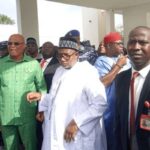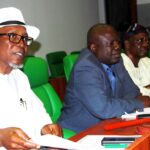By Stellamaries Amuwa, Abuja
Oxfam has unveiled a staggering wealth gap in Nigeria, warning of a potential social crisis without urgent action.Two comprehensive studies, “Income and Wealth Inequality in Nigeria: Trends and Drivers” and “Taxing the Rich: Fair Tax Monitor,” expose profound inequalities.
The findings reveal that over 99% of Nigeria’s wealthiest citizens evade or avoid taxes, leaving millions in poverty.
John Makina, Oxfam’s Country Director in Nigeria, made known the alarming contrast between the super-rich, who continue to amass wealth, and the millions struggling to afford their next meal. “Complex tax laws and a lack of transparency allow the wealthy to avoid their fair share of taxes, depriving the country of essential revenue for social protection and inequality-reduction programs.”
Despite being the fourth-largest economy in Africa, Nigeria has a wealth Gini coefficient of 35.1, ranking it among the most unequal countries in West Africa. The report finds that the wealthiest Nigerians could spend N1 million daily for 42 years without exhausting their fortunes, while nearly 70% of Nigerians face hunger, disproportionately affecting women and children.
Similarly, the Executive Director, Civil Society Legislative Advocacy Centre, Auwal Musa Rafsanjani, commended Oxfam for its ongoing advocacy and urged the organization to continue raising awareness about critical issues.
“This is the foundation upon which our country can overcome various challenges.”
Rafsanjani mentioned that a supplementary report would be released soon but highlighted key concerns regarding Nigeria’s increasing inequality. He attributed the rise in inequality to the lack of comprehensive development frameworks. “In the past, we had development frameworks,” he noted, but since the return to democracy, Nigeria has only implemented one. This absence of planning hinders policymakers and legislators from addressing the populace’s needs, resulting in numerous projects being abandoned after funding is allocated, leaving thousands incomplete across the country.
Rafsanjani also criticized rampant corruption, calling it the “liberalization and democratization” of theft. He pointed out that resources intended for essential services such as water, education, and healthcare are often diverted or stolen, exacerbating inequality by denying access to those who should benefit from these resources.
Oxfam urges the Nigerian government to adopt progressive wealth taxation, increase social investment, and implement pro-poor policies to bridge the growing wealth gap. Implementing a 1% wealth tax on the nation’s richest individuals could generate over $7.5 billion annually, significantly enhancing the government’s capacity to fund healthcare, education, and rural development.
The report underscores that without immediate action, Nigeria’s inequality crisis could lead to widespread social unrest.
WAF-Oxfam International Regional Director Assalama Sidi emphasized Nigeria’s economic status’s profound impact on the entire African continent, stating, “When Nigeria rises, Africa rises,” but warning that “when things go wrong in Nigeria, the whole of West Africa, if not all of Sub-Saharan Africa, is impacted.”
Sidi noted that despite being Africa’s largest economy, Nigeria is home to a significant portion of the world’s poorest people, underscoring the urgency for change. She highlighted that rising inequalities in Nigeria are not irreversible; they hinge on political will and decisive action. Alarmingly, only 5 to 7% of Nigeria’s national budget is allocated to critical social services like education and healthcare, disproportionately affecting women, children, and vulnerable populations.



